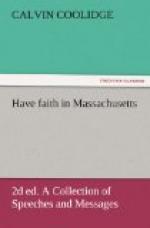These thoughts are overpowering. But let us beware of fate and destiny. Barbarians have decreased, but barbarism still exists. Rome boasted the name of the Eternal City. It was but eight hundred years from the sack of the city by one tribe of barbarians to the sack of the city by another tribe of barbarians. Between lay something akin to a democratic commonwealth. Then games, and bribes for the populace, with dictators and Caesars, while later the Praetorian Guard sold the royal purple to the highest bidder. After which came Alaric, the Goth, and night. Since when democracy lay dormant for some fifteen centuries. We may claim with reason that our Nation has had the guidance of Providence; we may know that our form of government must ultimately prevail upon earth; but what guaranty have we that it shall be maintained here? What proof that some unlineal hand, some barbarism, without or within, shall not wrench the sceptre of democracy from our grasp? The rule of princes, the privilege of birth, has come down through the ages; the rule of the people has not yet marked a century and a half. There is no absolute proof, no positive guaranty, but there is hope and high expectation, and the path is not uncharted.
It may be some help to know that, however much of glory, there is no magic in American democracy. Let us examine some more of this Declaration of ours, and examine it in the light of the events of those solemn days in which it was adopted.
Men of every clime have lavished much admiration upon the first part of the Declaration of Independence, and rightly so, for it marked the entry of new forces and new ideals into human affairs. Its admirers have sometimes failed in their attempts to live by it, but none have successfully disputed its truth. It is the realization of the true glory and worth of man, which, when once admitted, wrought vast changes that have marked all history since its day. All this relates to natural rights, fascinating to dwell upon, but not sufficient to live by. The signers knew that well; more important still, the people whom they represented knew it. So they did not stop there. After asserting that man was to stand out in the universe with a new and supreme importance, and that governments were instituted to insure life, liberty, and the pursuit of happiness, they did not shrink from the logical conclusion of this doctrine. They knew that the duty between the citizen and the State was reciprocal. They knew that the State called on its citizens for their property and their lives; they laid down the proposition that government was to protect the citizen in his life, liberty, and pursuit of happiness. At some expense? Yes. Those prudent and thrifty men had no false notions about incurring expense. They knew the value of increasing their material resources, but they knew that prosperity was a means, not an end. At cost of life? Yes. These sons of the Puritans, of the Huguenots, of the men of Londonderry, braved




